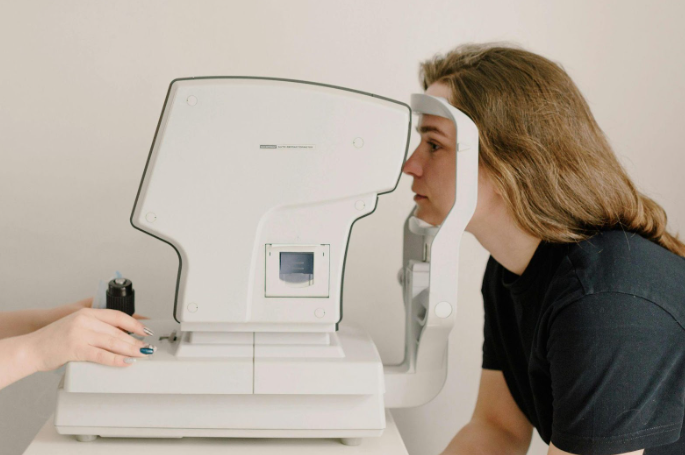A Comprehensive Guide to Eye Bruising (Subconjunctival Hemorrhage)

We’ve all heard of a black eye, but when the blood is in the eye itself, it can be a cause for concern. The typical whites of our eyes having red within them is something akin to the start of a zombie movie or horror film, but fear not! This condition, known interchangeably as eye bruising or subconjunctival hemorrhaging is more common than you’d think.
What Is Eye Bruising (Subconjunctival Hemorrhaging)?
Eye bruising, medically known as subconjunctival hemorrhaging, is when a small blood vessel bursts underneath the conjunctiva, the clear surface covering the white part of the eye (sclera). This causes blood to pool and create a noticeable red or dark patch. It might look alarming, but it's usually harmless and painless.
What Are the Typical Causes?
Here are some of the more common causes of subconjunctival hemorrhages:
- Trauma: A direct hit or injury to the eye can easily cause a blood vessel to burst.
- Sudden Increases in Pressure: Actions like severe coughing, sneezing, heavy lifting, or even vomiting can cause a sudden spike in blood pressure, leading to a burst vessel.
- Eye Rubbing or Straining: Vigorous rubbing of the eyes or excessive strain, for instance, during prolonged periods of computer use, can lead to hemorrhaging.
What Are the Symptoms?
The most obvious symptom of a subconjunctival hemorrhage is the appearance of a red or dark patch on the white of the eye. This patch might be small or cover a larger area, but it doesn't usually cause pain or discharge. Despite its alarming appearance, it also typically doesn't affect your vision.
Who Is More at Risk for Eye Bruising?
While anyone can experience subconjunctival hemorrhaging, certain groups are more at risk:
Older Adults
As we age, the walls of our blood vessels can become thinner and more fragile, making them more susceptible to rupture even with minor increases in pressure. Additionally, age-related health issues such as hypertension and diabetes further contribute to the likelihood of experiencing eye bruising.
People with High Blood Pressure
Hypertension, or high blood pressure, puts additional strain on blood vessels throughout the body, including those in the eyes. This increased pressure can cause the vessels to burst more easily, leading to subconjunctival hemorrhages, especially during activities that cause sudden pressure spikes.
Individuals on Blood Thinners
Medications that thin the blood, such as aspirin, warfarin, or certain supplements, reduce the blood's ability to clot. This means that any minor injury to a blood vessel can result in more significant bleeding, making the appearance of eye bruising more noticeable and frequent.
Diabetics
Diabetes can lead to changes in blood vessels, making them more prone to damage. High blood sugar levels can weaken the blood vessel walls and make them more susceptible to rupturing under pressure or strain.
Those with Blood Disorders
Conditions that affect blood clotting, such as hemophilia or thrombocytopenia, increase the risk of bleeding. These disorders can cause even minor injuries to lead to significant bleeding, including within the delicate vessels in the eyes.
When Should You See a Medical Professional?
While a subconjunctival hemorrhage is often harmless and resolves on its own within a few weeks, there are certain situations when you should seek medical attention:
- Frequent Occurrences: If you find yourself experiencing this condition often, it might indicate an underlying health issue that needs addressing.
- Accompanying Symptoms: If you have pain, vision changes, or a significant amount of discharge, you should see a doctor immediately.
- Trauma-Related Hemorrhage: If the hemorrhage follows a significant injury to the eye, it’s important to get it checked out to rule out other damage.
- Bleeding Disorders or Medication: If you have a known bleeding disorder or are on blood-thinning medication, it’s a good idea to consult a doctor.
How Do Medical Professionals Treat Subconjunctival Hemorrhaging?
For most cases of subconjunctival hemorrhage, no treatment is necessary. The blood will reabsorb into the body naturally over time. However, here’s what you can expect if you visit a medical professional:
- Diagnosis: Your doctor will conduct a thorough examination of your eye, including asking you about your medical history and any recent activities that might have resulted in trauma, to confirm the hemorrhage and rule out any other issues.
- Monitoring: If the hemorrhage is linked to an injury or a medical condition, your doctor may want to monitor your progress to ensure there are no complications.
- Addressing Underlying Conditions: If an underlying health issue like hypertension or diabetes is identified, managing this condition will be part of your treatment plan.
- Advice and Prevention: Your doctor might provide advice on preventing future hemorrhages to help lessen the risk of getting more eye bruises.
Preventive Measures and Home Care
While you can't always prevent subconjunctival hemorrhages, there are steps you can take to minimize your risk. Keeping your blood pressure under control with a healthy diet, regular exercise, and prescribed medications if necessary is one way to prevent eye bruising. Another is to avoid rubbing your eyes vigorously and to take breaks when using screens for extended periods of time to reduce eye strain.
If you’re involved in activities that could result in eye trauma, such as certain sports, make certain you have the correct protective eyewear to keep your eyes safe. If you're on blood thinners as well, follow your doctor's advice and report any unusual bleeding, whether in your eye or another location.
Finally, the best way to be fully preventative is to always keep to regular check-ups and to manage conditions like diabetes so that your blood vessels stay as healthy as you can.
At Baptist Eye Surgeons, we provide optical relief and care to patients throughout Tennessee. If you’re having trouble with eye bruising, contact us today on our website or by phoning (865) 579-3920 for an appointment!





